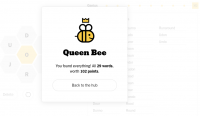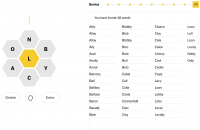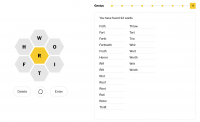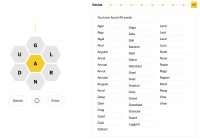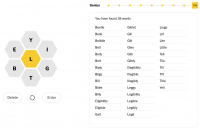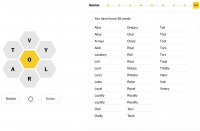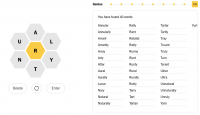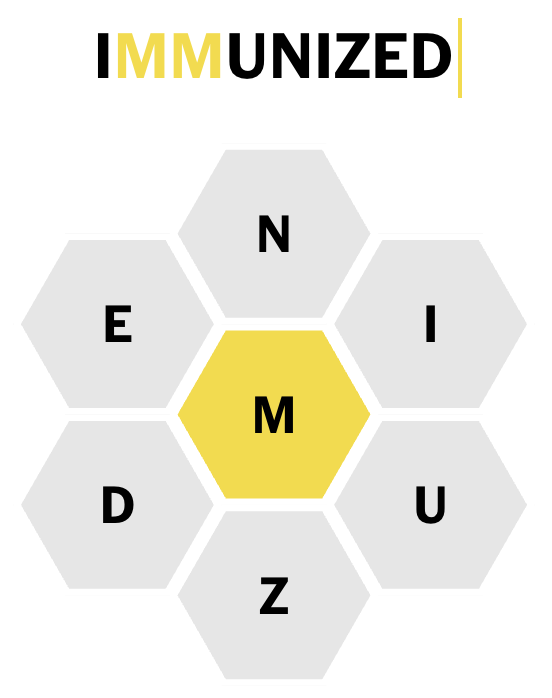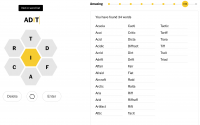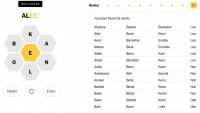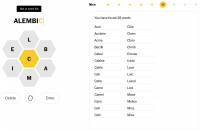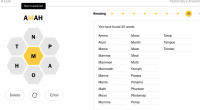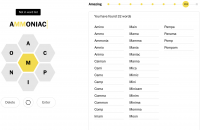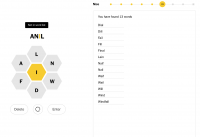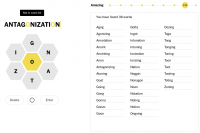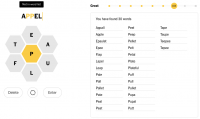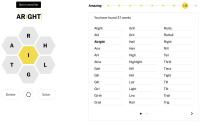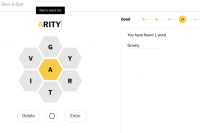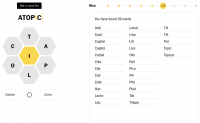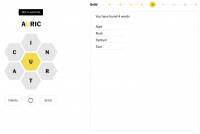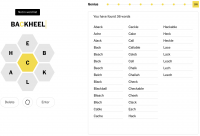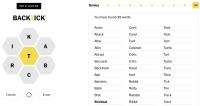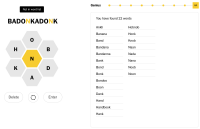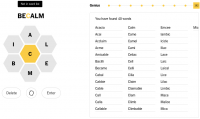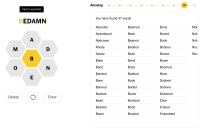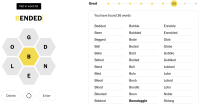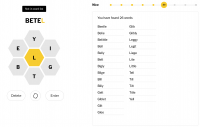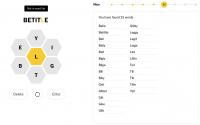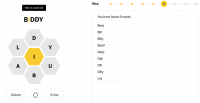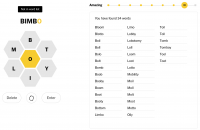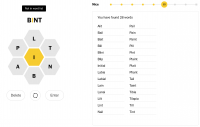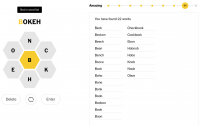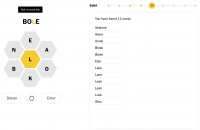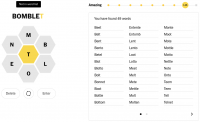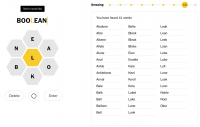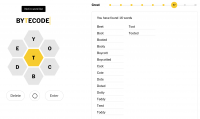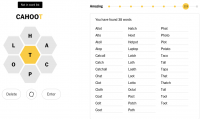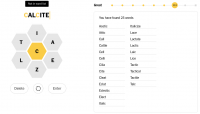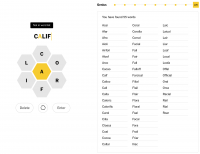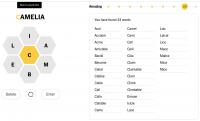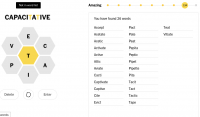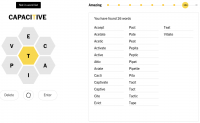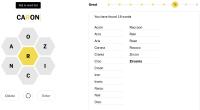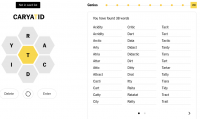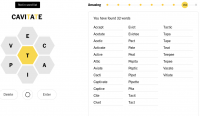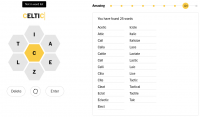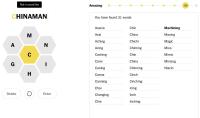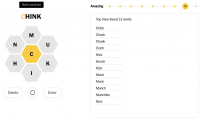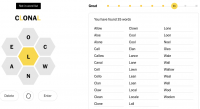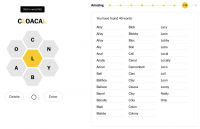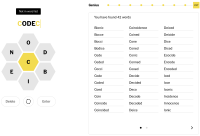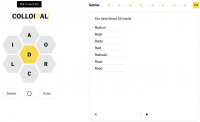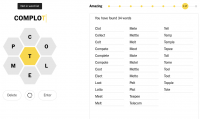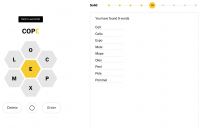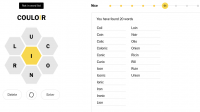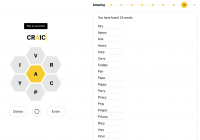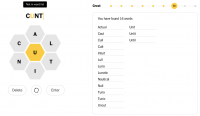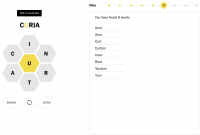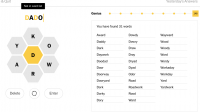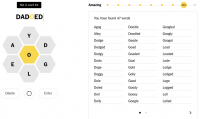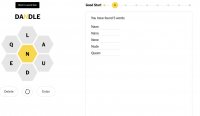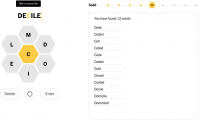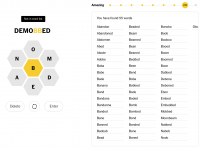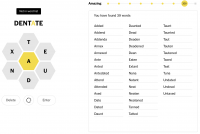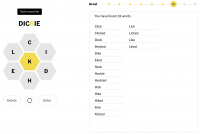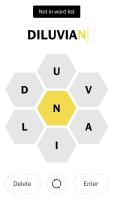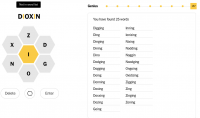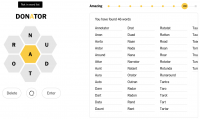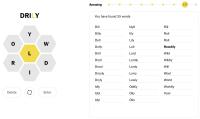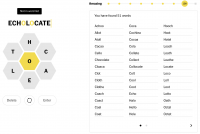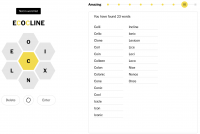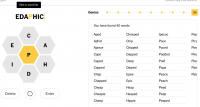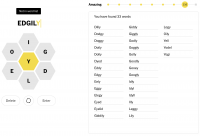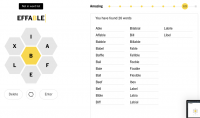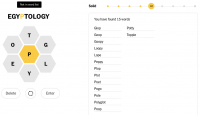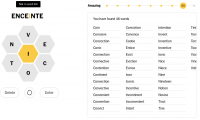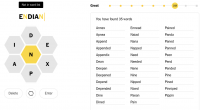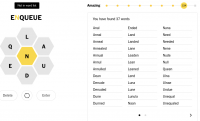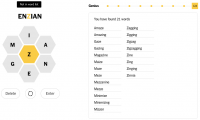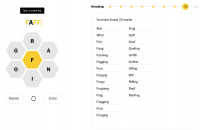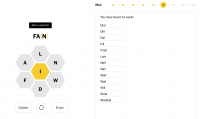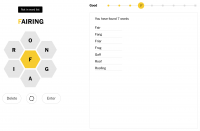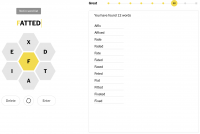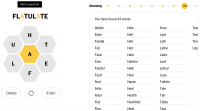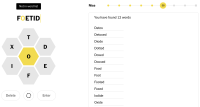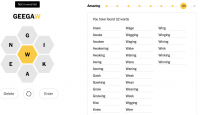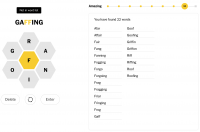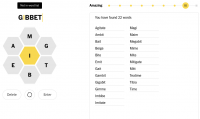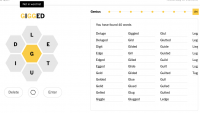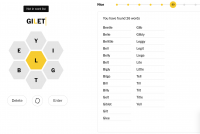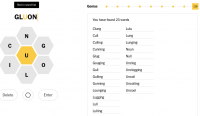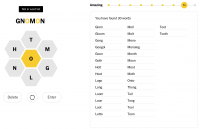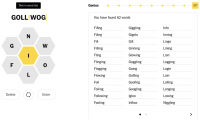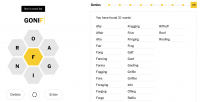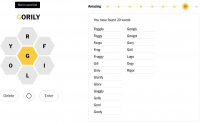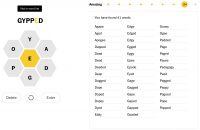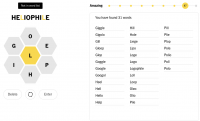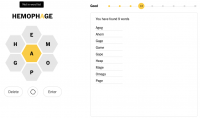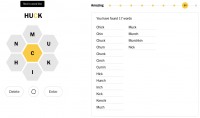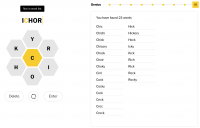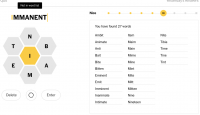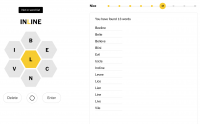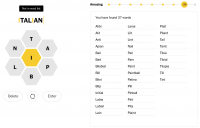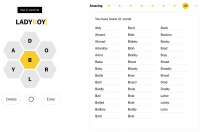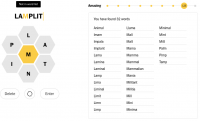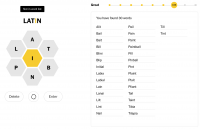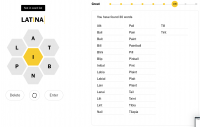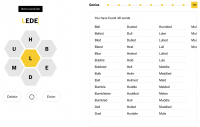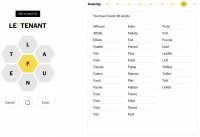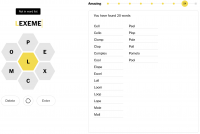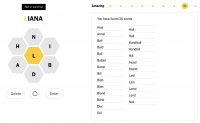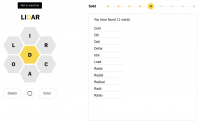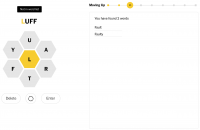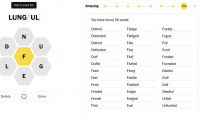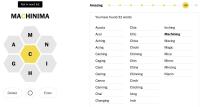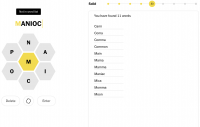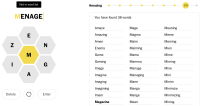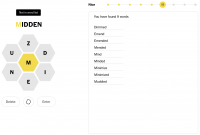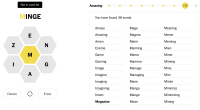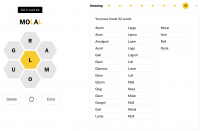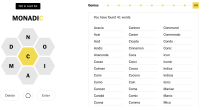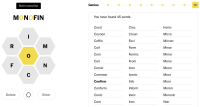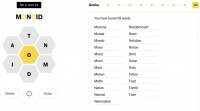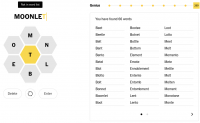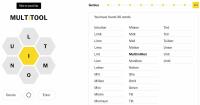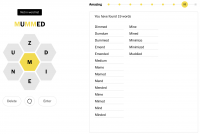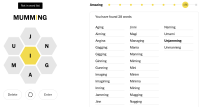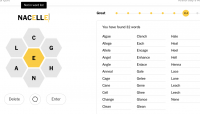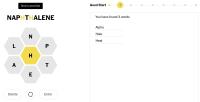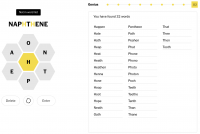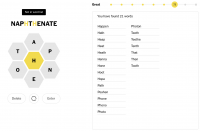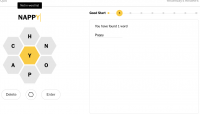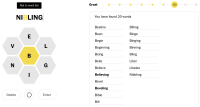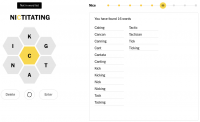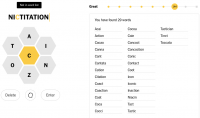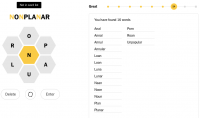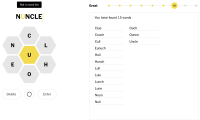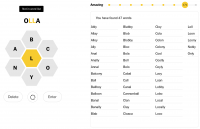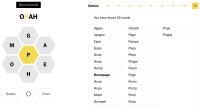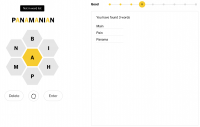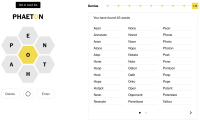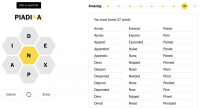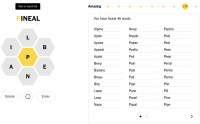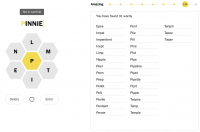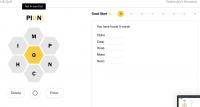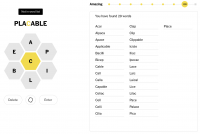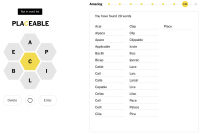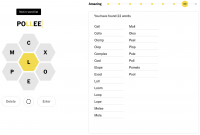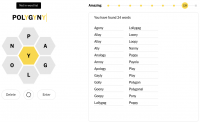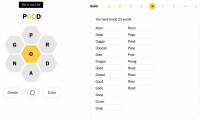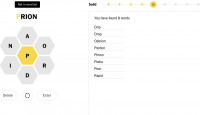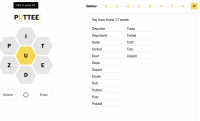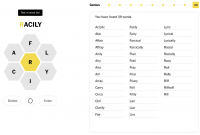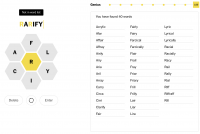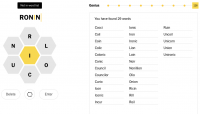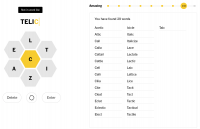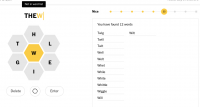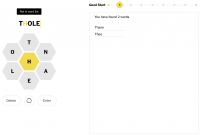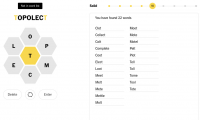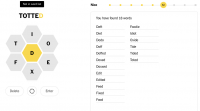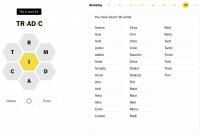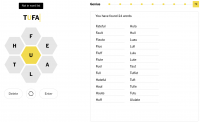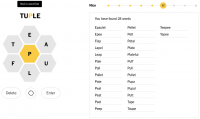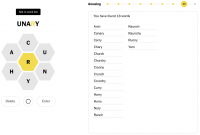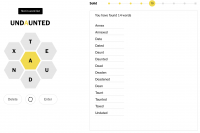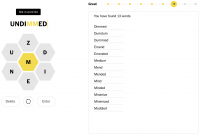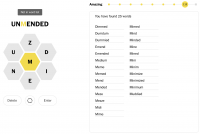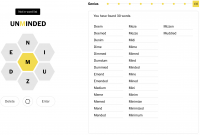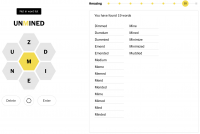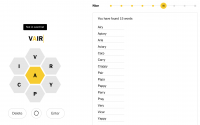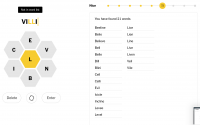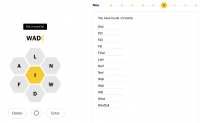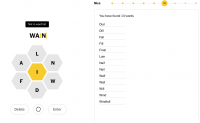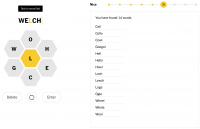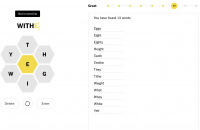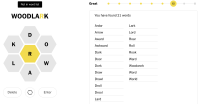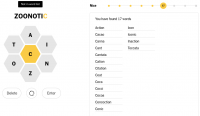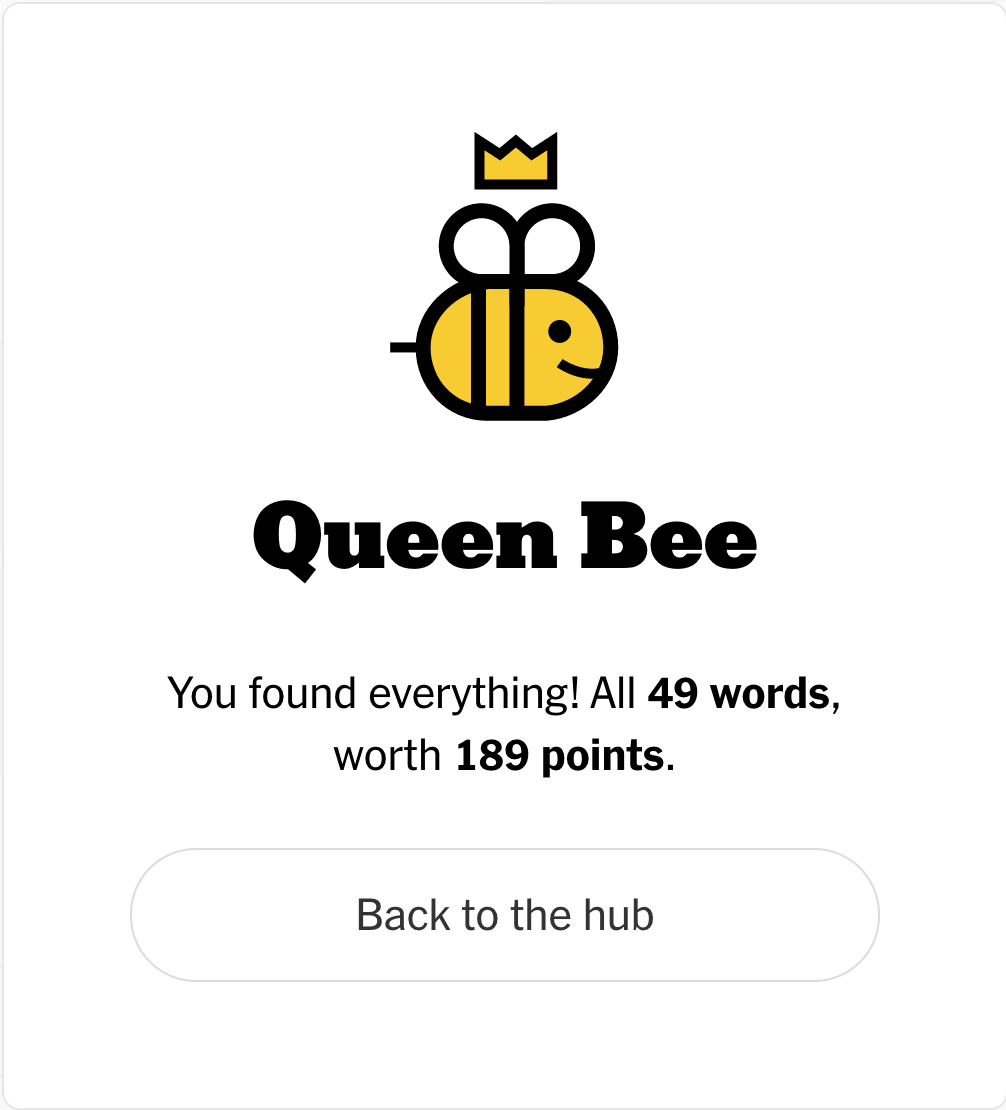NY Times Spelling Bee
I recently wrote that Kath and I have a one-year streak going in the NYT Crossword Puzzle. While that is still ongoing, we’ve also recently discovered a little gem called Spelling Bee (New York Times). The concept is elegant and simple:
- You get seven letters arranged in a honeycomb.
- You have to combine these letters to come up with as many words with four letters or more as you can.
- The middle letter is required.
- You can repeat letters as much as you like.
- Answers can overlap one another. (E.g. “glad” and “gladly” are two separate answers).
- The longer the word, the more points you get.
- You can an extra bonus for pangrams (words that use all of the letters at least once)[1]
- The puzzle rates your performance with “good”, “nice”, “great”, “awesome”, and, finally, “genius”[2] (You can click your progress indicator to see how many points are required for each level.)
- There is always a pangram (a word that uses all of the letters)
You can check your word list against the master word list only on the next day, which is kind of nice and zen.
Spelling Bee Solver
Update: January 2021
You can get some hints about the kinds of answers in the puzzle from the Spelling Bee Solver. It shows how many words there are that start with each letter, tells you how many pangrams there are, and how many total words and points. There’s even a matrix with starting letters in the rows and number of letters in the columns.
This is super-helpful and makes it a bit more fun when you’re just spinning your wheels and not seeing any words anymore. A lot of times, it just helps to know that there are two more four-letter words starting with “C”—and then they just pop out when you’d just spent ten minutes, scouring the puzzle and not seeing anything at all.
Queen Bee
There is a level beyond genius called “Queen Bee”—and we finally got one.
We’ve since gotten Queen Bee quite a few times—a handful of times with no help whatsoever, but a lot more when consulting the matrix in the solver mentioned above.
Samples
Here are a couple of games that we’ve completed, just to show off.
Now, the bad news
Would I be reporting on this fun little game if it was all sunshine and roses? No, no, I probably wouldn’t.
You see, there are some words I’ve learned over the years, for which I’ve borne more than my share of ridicule for knowing, that the puzzle refused to acknowledge as being “in its word list”.
I was shocked and disappointed[3] to see that certain words that I’ve kept in my back pocket, as it were, for just such a rainy day as this, were not recognized.
Proof? Of course I have proof.
The following are definitions from the Free Dictionary. While not exactly common, these are all non-archaic words that are not proper nouns. Those that are chiefly British (e.g. demobbed) might be understandable as “too rare” were the puzzle not to regularly include incredibly obscure references to fish and fruit species. There isn’t really much consistency on what is considered a proper noun or what is considered “rare”.
Update 12.03.2022: Today was a very interesting day. Kath and I got to Queen Bee without even looking at the Spelling Bee Solver. We also got the pangram “Immunized” as the third-last word (“Immune” and “Immunize” were the final two words). However, not only did we power right through to Queen Bee very quickly, we also picked up six pretty common words that the puzzle did not accept. That is a record for one day. The words were “Midden”, “Mummed”, “Undimmed”, “Unmended”, “Unminded”, and “Unmined”.
Update 20.01.2024:We recently had a couple of puzzles that had very few words and points. One of them was rhythmic, with a total of 20 words for 85 points. The other was Homepage, with a total of 27 words for only 76 points. More words, but fewer points because the words were shorter, on average.
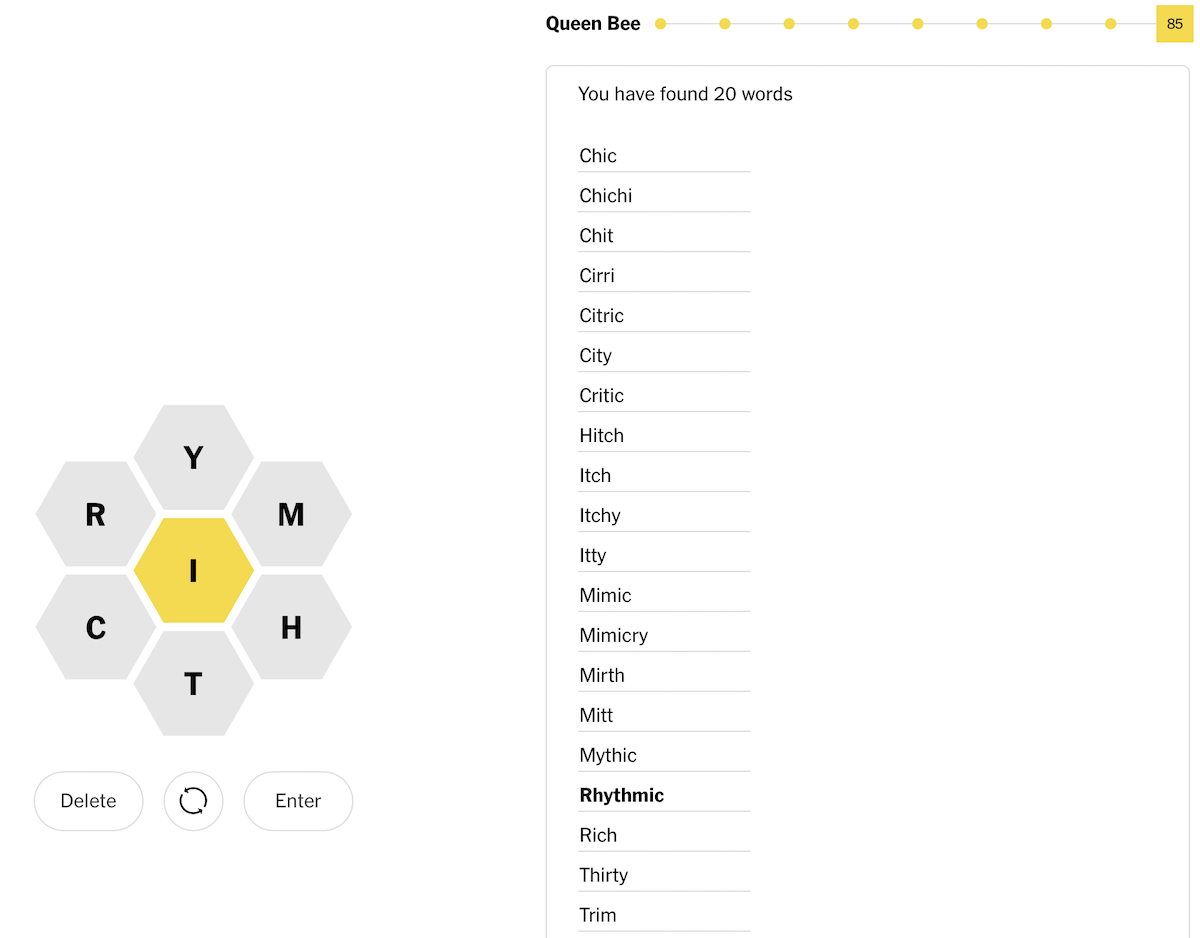
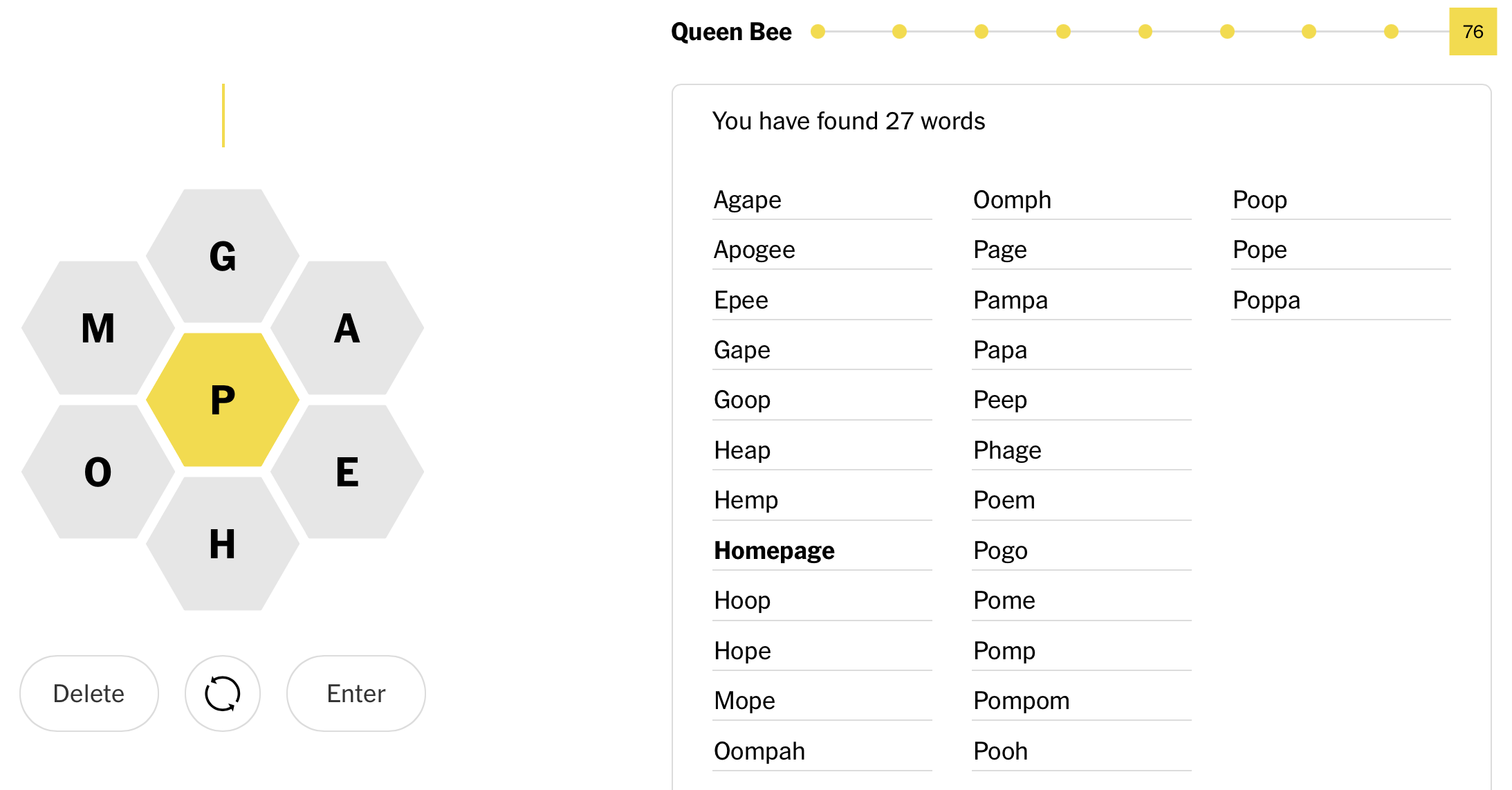
alembic: An apparatus consisting of two vessels connected by a tube, formerly used for distilling liquids.
bokeh: The effect of blurriness in the areas of an image that fall outside a photograph’s depth of field
boolean: Of or relating to a logical combinatorial system treating variables, such as propositions and computer logic elements, through the operators AND, OR, NOT, and XOR
calcite: A common crystalline form of natural calcium carbonate, CaCO3, that is the basic constituent of limestone, marble, and chalk.
calif: A leader of an Islamic polity, regarded as a successor of Muhammad and by tradition always male. (Also: califf or caliph)
camelia: Any of several shrubs or small evergreen trees having solitary white or pink or reddish flowers
capacitative: Pertaining to electrical capacitance, or the property of being able to collect and hold a charge of electricity.
capacitive: Pertaining to electrical capacitance, or the property of being able to collect and hold a charge of electricity.
caron: A diacritical mark (ˇ) that is used over certain letters, such as č, to indicate quality of pronunciation. Also called haček.
caryatid: A sculpted female figure serving as an architectural support taking the place of a column or a pillar supporting an entablature on her head.
cavitate: To form holes or cavities within an agitated liquid; react upon the water with *cavitation (which see): said of a screw propeller.
chink: A narrow opening, such as a crack or fissure. (presumably not recognized because the snowflakes think it could only be a slur for Chinese person.)
cloacal: Related to the common cavity that serves as the opening for the intestinal, genital, and urinary tracts in many vertebrates, including amphibians, reptiles, birds, monotremes, and some fishes
craic: Irish vernacular for “fun”, e.g. “when I’m at the pub with the lads, we always have a good craic.”
decile: Any of the groups that result when a frequency distribution is divided into ten groups of equal size.
dickie: A woman’s blouse front worn under a suit jacket or low-necked garment or a man’s detachable shirt front.
dioxin: a general name for a family of chlorinated hydrocarbons (esp. as a byproduct of some pesticides).
echolocate: To navigate by emitting high-pitched sounds and interpreting their echoes to determine the direction and distance of objects.
fairing: An auxiliary structure or the external surface of a vehicle, such as an aircraft, that serves to reduce drag.
gaff: A metal hook fastened to a pole; to cheat; fleece; harsh treatment or criticism (also, gaffing)
gluon: A massless, neutral vector boson that mediates strong interactions between quarks, binding them together within hadrons.
ladyboy: The Indo-European language of the ancient Latins and Romans and the most important cultural language of western Europe until the end of the 17th century.
latin: The Indo-European language of the ancient Latins and Romans and the most important cultural language of western Europe until the end of the 17th century.
lede: The introductory portion of a news story, especially the first sentence. (As of July 2021, this word is now accepted.)
lidar: An optical sensing technology used to determine the position, velocity, or other characteristics of distant objects by analysis of pulsed laser light reflected from their surfaces.
monadic: An indivisible, impenetrable unit of substance viewed as the basic constituent element of physical reality in the metaphysics of Leibniz.
nacelle: A streamlined housing or tank for something on the outside of an aircraft or motor vehicle.
naphthalene: A white crystalline aromatic compound, C10H8, derived from coal tar or petroleum and used in manufacturing dyes, moth repellents, and explosives and as a solvent. Also called tar camphor.
nictitating: Winking. Usually used with nictitating membrane to describe the transparent third eyelid that some animals have.
nonplanar: not lying or able to be confined within a single plane : having a three-dimensional quality.
opah: A large, oval-shaped fish (Lampris guttatus) having a silvery iridescent body with red fins and edible red flesh. Also called moonfish.
panamanian: A native or inhabitant of Panama (which was accepted as a word, although it’s a proper noun)
pinnie: One of a set of uniformly colored, usually sleeveless shirts worn as a temporary team uniform, as when scrimmaging.
pion: Any of the three least massive mesons, having a positive, neutral, or negative electric charge
pood: A Russian unit of weight equivalent to about 16.4 kilograms (36.1 pounds) avoirdupois. (Used for kettle bells.)
prion: A protein particle that is the agent of infection in a variety of neurodegenerative diseases, including bovine spongiform encephalopathy, Creutzfeldt-Jakob disease, and scrapie. (As of November 2022, this word is now accepted.)
puttee: A strip of cloth wound spirally around the leg from ankle to knee. A gaiter covering the lower leg.
thole: A wooden pin or one of a pair, set upright in the gunwales of a rowing boat to serve as a fulcrum in rowing
triadic: A chord of three tones, especially one built on a given root tone plus a major or minor third and a perfect fifth.
tufa: A soft, friable, and porous sedimentary rock consisting of calcium carbonate and formed by the evaporation of water, especially at the mouth of a hot spring or on a drying lakebed.
villi: A minute projection arising from a mucous membrane, especially one of the numerous vascular projections of the small intestine. (singular, villus)
wadi: A valley, gully, or streambed in northern Africa and southwest Asia that remains dry except during the rainy season; an oasis
woodlark: A songbird (Lullula arborea) of Europe, northern Africa, and the Middle East, having brownish plumage and a short tail and noted for its melodious song.
In the meantime, we’ve “cheated” with two open windows to be able to find out that there is, indeed, a final status for having found all of the words: “Queen Bee”.
We haven’t managed it for real—sometimes because we miss a word or two that should have known, but sometimes because there’s a word we didn’t know was a word, e.g. “footwall”—but we’ve gotten within one word one time. We had “knick”. We had “knack”. We forgot “knickknack”.
↩